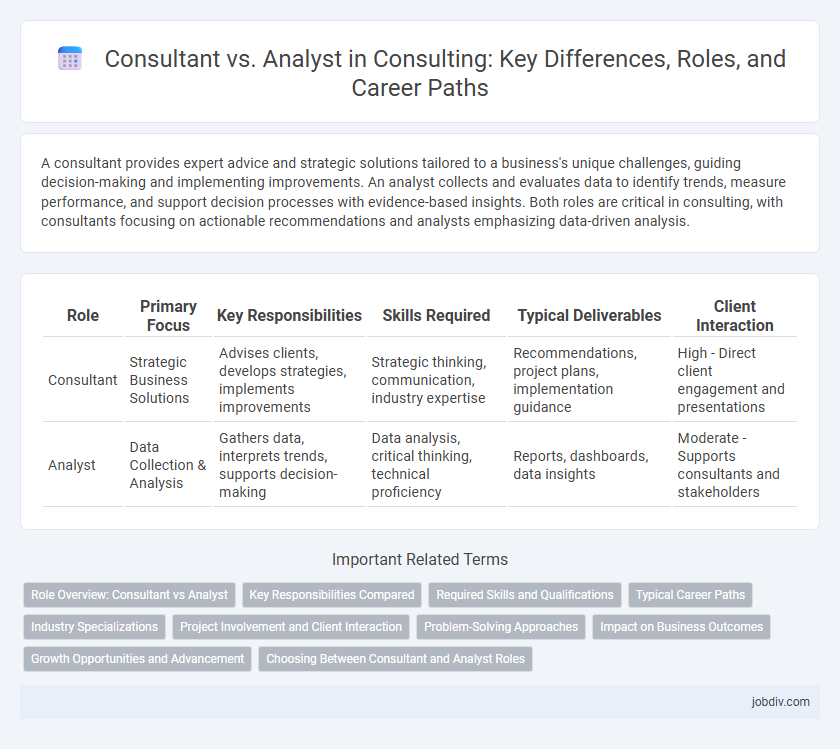A consultant provides expert advice and strategic solutions tailored to a business's unique challenges, guiding decision-making and implementing improvements. An analyst collects and evaluates data to identify trends, measure performance, and support decision processes with evidence-based insights. Both roles are critical in consulting, with consultants focusing on actionable recommendations and analysts emphasizing data-driven analysis.
Table of Comparison
| Role | Primary Focus | Key Responsibilities | Skills Required | Typical Deliverables | Client Interaction |
|---|---|---|---|---|---|
| Consultant | Strategic Business Solutions | Advises clients, develops strategies, implements improvements | Strategic thinking, communication, industry expertise | Recommendations, project plans, implementation guidance | High - Direct client engagement and presentations |
| Analyst | Data Collection & Analysis | Gathers data, interprets trends, supports decision-making | Data analysis, critical thinking, technical proficiency | Reports, dashboards, data insights | Moderate - Supports consultants and stakeholders |
Role Overview: Consultant vs Analyst
Consultants provide strategic advice and actionable solutions to improve business performance, often engaging directly with clients to implement changes and drive growth. Analysts focus on data gathering, interpretation, and reporting to support decision-making processes, utilizing quantitative tools to deliver insights. The consultant's role emphasizes client interaction and problem-solving, while the analyst centers on data analysis and technical evaluation.
Key Responsibilities Compared
Consultants primarily focus on providing strategic advice, implementing solutions, and managing client relationships to drive business growth and operational improvements. Analysts concentrate on gathering data, performing detailed assessments, and generating reports to support decision-making processes with quantitative insights. Both roles require strong analytical skills, but consultants emphasize client interaction and strategic execution, while analysts prioritize data analysis and problem identification.
Required Skills and Qualifications
Consultants typically require strong interpersonal skills, strategic thinking, and industry-specific expertise to analyze client needs and deliver actionable solutions, often backed by an advanced degree such as an MBA. Analysts must excel in data interpretation, critical thinking, and technical proficiencies like Excel, SQL, or Python, usually holding a bachelor's degree in fields such as finance, economics, or computer science. Both roles demand excellent communication abilities, but consultants prioritize client management and presentation skills, while analysts emphasize data accuracy and analytical methodologies.
Typical Career Paths
Consultants typically advance by gaining industry expertise and client management skills, progressing from junior roles to senior consultant, project manager, and eventually partner or director positions. Analysts often start in data collection and interpretation roles, moving up to senior analyst, data scientist, or business intelligence manager roles within analytics or specialized fields. While consultants emphasize strategic problem-solving and client interaction, analysts focus more on data-driven insights, with career paths reflecting these core competencies.
Industry Specializations
Consultants bring deep industry expertise, offering strategic guidance tailored to specific sectors such as healthcare, finance, or technology, while analysts primarily focus on data-driven insights within those industries to support decision-making processes. Consultants leverage their understanding of industry trends, regulatory environments, and competitive landscapes to design customized solutions, whereas analysts concentrate on interpreting quantitative data, market research, and performance metrics. The synergy between consultants' specialized knowledge and analysts' detailed data analysis drives effective problem-solving and innovation in complex business environments.
Project Involvement and Client Interaction
Consultants engage deeply in project management, offering strategic guidance and frequently collaborating with clients to tailor solutions that address complex business challenges. Analysts focus primarily on data collection and interpretation, providing insights that inform decision-making but often remain behind the scenes in client interactions. Consultants typically maintain proactive communication with clients throughout the project lifecycle, ensuring alignment and adapting strategies based on evolving needs.
Problem-Solving Approaches
Consultants typically adopt a strategic, big-picture problem-solving approach, leveraging industry knowledge and experience to develop tailored solutions for complex business challenges. Analysts focus on detailed data gathering, statistical analysis, and process evaluation to identify root causes and support evidence-based decision-making. Both roles complement each other by combining high-level strategy with in-depth analytical insights to drive effective business outcomes.
Impact on Business Outcomes
Consultants drive strategic change by leveraging industry expertise to develop actionable solutions that directly improve business performance and competitive advantage. Analysts focus on data interpretation and trend identification, providing critical insights that inform decision-making processes and operational efficiency. The combined efforts of consultants and analysts lead to enhanced business outcomes through informed strategy and data-driven execution.
Growth Opportunities and Advancement
Consultants typically engage in strategic decision-making and project leadership, creating broader growth opportunities through client interactions and diverse industry exposure, whereas analysts often concentrate on data evaluation and reporting, building expertise that supports advanced analytical roles. Advancement for consultants often leads to managerial or partnership positions driven by impact and client relationship management, while analysts progress into specialized analyst roles or transition into consultancy by leveraging their technical skills. Both paths offer distinct growth trajectories, with consultants gaining influence over business strategies and analysts developing deep domain expertise.
Choosing Between Consultant and Analyst Roles
Choosing between consultant and analyst roles depends on career goals and skill sets: consultants focus on strategic advice and client-facing interactions, while analysts emphasize data gathering and detailed problem-solving. Consultants typically require strong communication and leadership abilities, whereas analysts excel in data analysis and technical expertise. Understanding these distinctions helps professionals align their strengths with role expectations for career growth in consultancy.
Consultant vs Analyst Infographic

 jobdiv.com
jobdiv.com